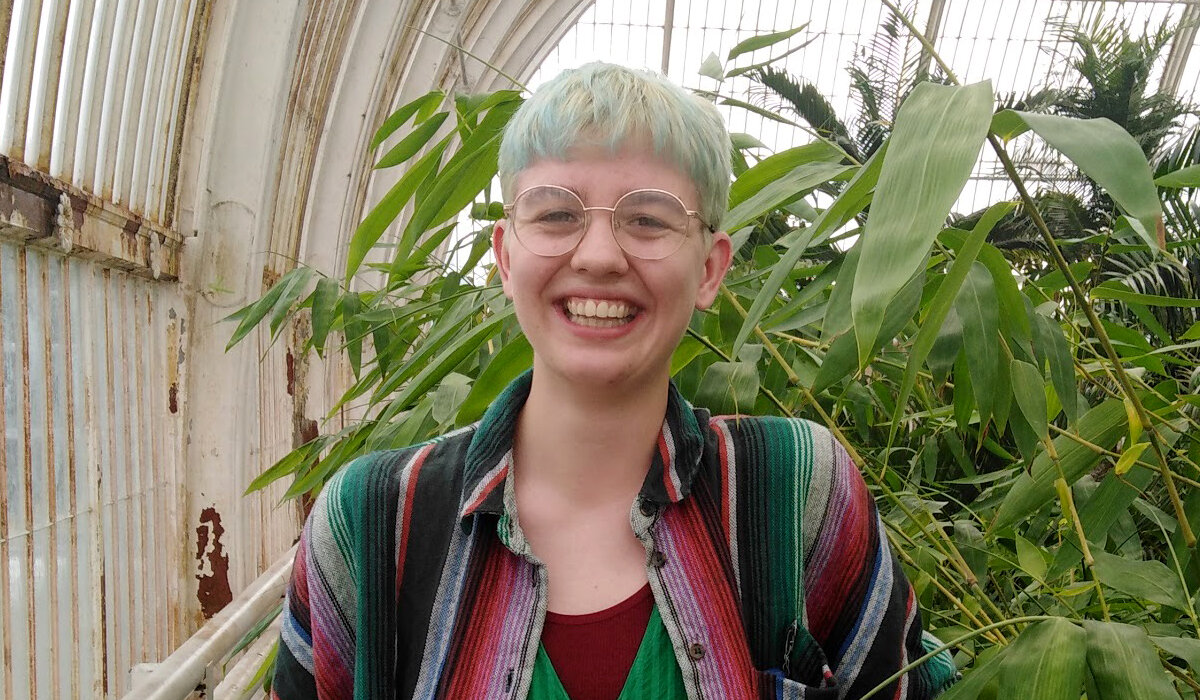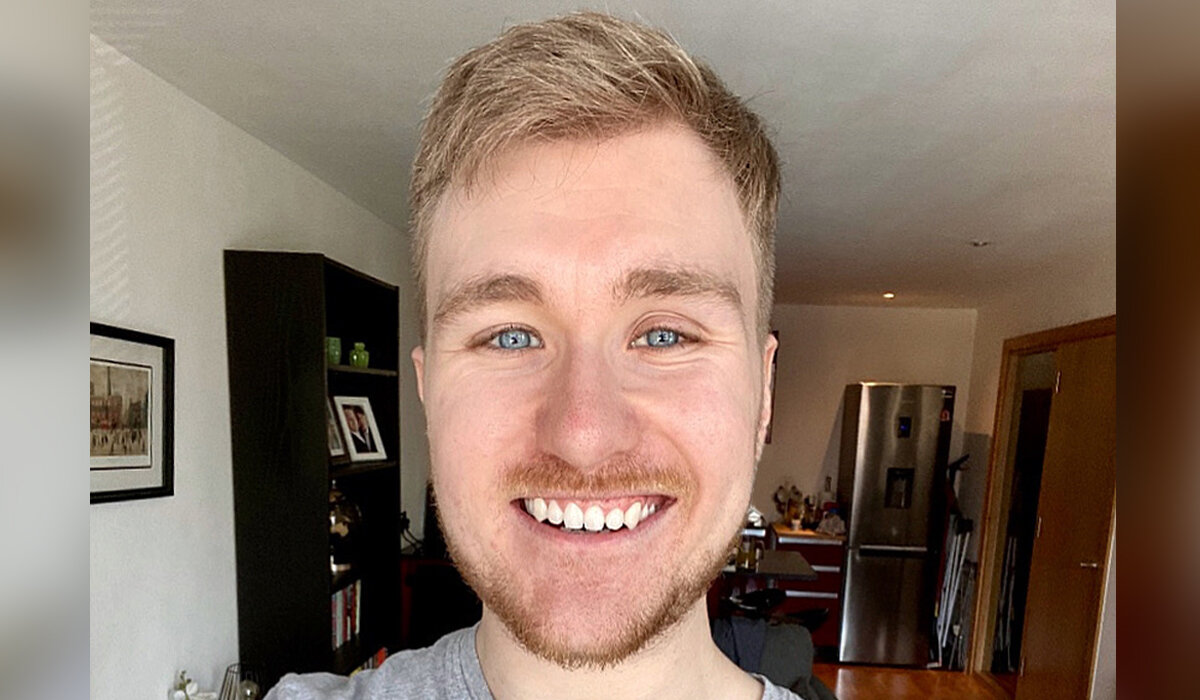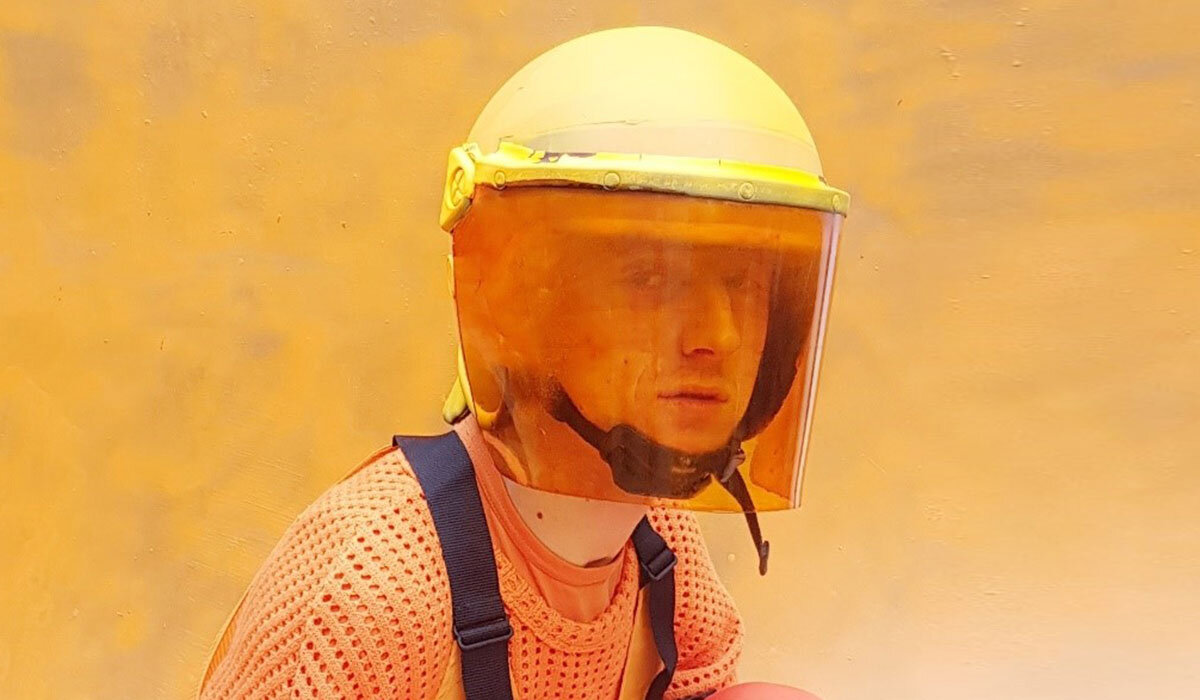
"I am very proud to be a queer person and a member of the community."
Sophie Gribben
- on celebrating Pride Month and being part of the LGBTQ+ community
Celebrating Pride Month with...Sophie Gribben
To celebrate Pride Month in the UK, we’re interviewing autistic members of the LGBTQ+ community.
Next up is Sophie Gribben. Sophie chats to us about life on the spectrum as a queer, non-binary person, celebrating Pride, and finding joy in TARDIS shaped police boxes!
When were you diagnosed as autistic?
I was diagnosed when I was 18, after really struggling with the transition from school to university. I had known for a while I was autistic, but was in need of more support (like extra time, and a study mentor), so a diagnosis helped me get the funding for that.
What is being autistic like for you?
The world is overwhelming for me, for a start! I’m hypersensitive to noise and wear noise cancelling headphones. It’s given me a bit of a reputation, which I don’t mind. Being hypersensitive has its positives though. I find I enjoy being outdoors and in nature a lot more because I’m so tuned in to the world.
I feel like I am also a very joyful person, as my interests bring me so much happiness. For instance, there is a police box on Bucannan Street in Glasgow that makes me smile every time I walk past on my way to university as it reminds me of the TARDIS. I’m clumsy and eccentric and I love being just the way I am.
What has your experience as an autistic person in the LGBTQ+ community been like?
One of the things I have difficulty with is attending Pride festivities. I am sensitive to noise, and crowds, but if I am properly accommodated then I really enjoy myself! The first year I went to London Pride I shut down in Soho Square. Thankfully, I was rescued by a lovely couple who took me away from the crowds to a quieter area. They spoke clearly and calmly to me, and their assistance made all the difference in getting me home safe that day. Last year, I marched in the access section which made a big difference and meant I could last a lot longer and enjoy myself more.
Along the same lines, I haven’t been able to access much of the queer ‘scene’ as I don’t enjoy clubbing. This makes meeting other LGBTQ+ people harder, including dating. I haven’t had many relationships as I find the rules around that hard, and most advice is for straight people, which doesn’t always apply to a gay relationship. Despite this, I am very proud to be a queer person and a member of the community.
"I am very proud to be a queer person and a member of the community."

Why do you think representing autistic people in the LGBTQ+ community is so important?
It’s nice to read something or see something and relate to it. It’s a reminder that you are not the only one and there are other people like you. This goes for a lot of things.
For me, seeing other LGBTQ+ people made me realise that I was like them, and that I didn’t just dislike men, I liked women instead. Autistic people might not understand social convention, but a lot of us mimic it in a bid to act ‘normal’. Representing people like us who are queer can help us realise, ‘oh, I’m not incapable of romance, I’ve just been looking at the wrong set of people’.
How do you usually celebrate Pride and what do you enjoy most about it?
I enjoy marching in the parade every year, despite the crowds. It reminds me that my rights as a queer person came from protest. The fight isn’t quite over yet either, especially on the trans front (and non-binary people like me aren’t legally recognised yet), so it’s good to still march for that. The march can be quite overwhelming though, so I don’t tend to stick around much longer after that.
I don’t know if I’ll celebrate virtually this year, as I don’t really party during Pride. I usually march, go round collecting badges and then go home! Maybe I’ll just hang my Pride flag out the window.
How do you think LGBTQ+ spaces and parades can better accommodate autistic people?
I think there is still a lot to be done for access at Pride, not just for autistic people, but all disabled people. This includes things like making information available early, including timings, a map of where the march will start and end, the events and where will be busy, toilets and quiet spaces available. Being able to plan ahead of time is quite important to a lot of autistic folk.
Pride is a big event, and the crowds can be overwhelming. Quiet spaces should be available, clearly signposted and easy to get to. I remember waiting in a queue to get into a crowded area just to get to the quiet space. I had to give up and later had a meltdown that was preventable.
There also need to be community spaces outside of bars and clubs. Some steps are happening towards that. One of my favourite places to go before lockdown was Category Is Books in Glasgow - a queer bookshop where they run lots of community events that are accessible. I went to the craft group every month and was starting to make connections before lockdown.
How are you coping with the current COVID restrictions? Any advice for those who may be struggling?
I have sort of mourned the loss of my old routine - it sounds silly, but I really miss sitting on the train on my morning commute to university, looking out the window, listening to my music and having my cup of tea.
I’m settling in now, and I’m working from home over summer so that should reintroduce some routine. Just now, I’m using a whiteboard pinned up by my door with tasks for each day written out on bits of paper (so I can reuse them week by week and so I’ve got some choices). At the moment, it’s mainly just ‘draw’ and ‘exercise’, but it gives me a sense of routine and structure. I would also say following the same morning and night routine has been good - the world could be on fire but I’d still shower, then get dressed, then go down for breakfast!
I've also been going to the Glasgow National Autistic Society online social groups, which keeps me busy! You can find out more about Glasgow social groups here.
This is a difficult time, so don’t beat yourself up about behaving ‘more autistic’ or struggling with things you wouldn’t normally find hard.
Similar stories

“Diversity of mind is critical both on-screen and off-screen.”
Nick Ransom
- on neurodiversity in film and on TV
Read more

"Queer culture seems to have an issue with intersectionality, especially towards those with disabilities."
George Morl
- on attitudes towards autism and disability in the LGBTQ+ community
Read more

The Spectrum magazine
Explore one of the UK's largest collections of autistic art, poetry, and prose. The Spectrum magazine is created by and for autistic people, and is available both online and in print.
Read the Spectrum





You are not alone
Join the community
Our online community is a place for autistic people and their families to meet like-minded people and share their experiences.
Join today